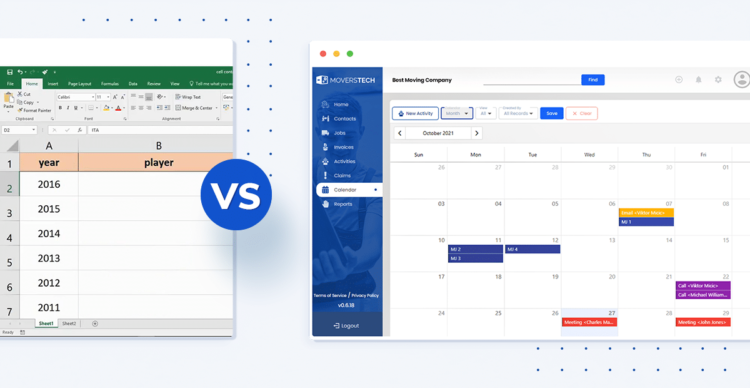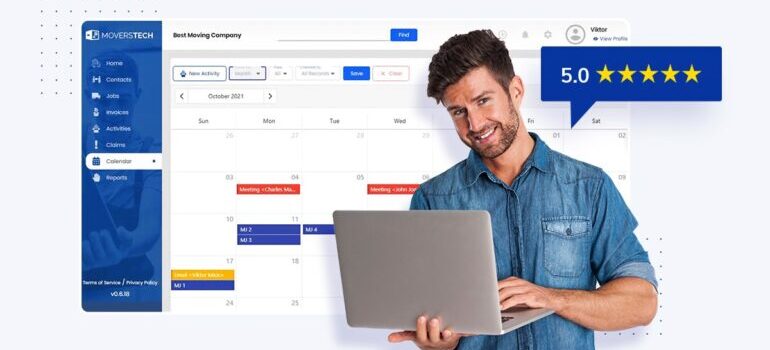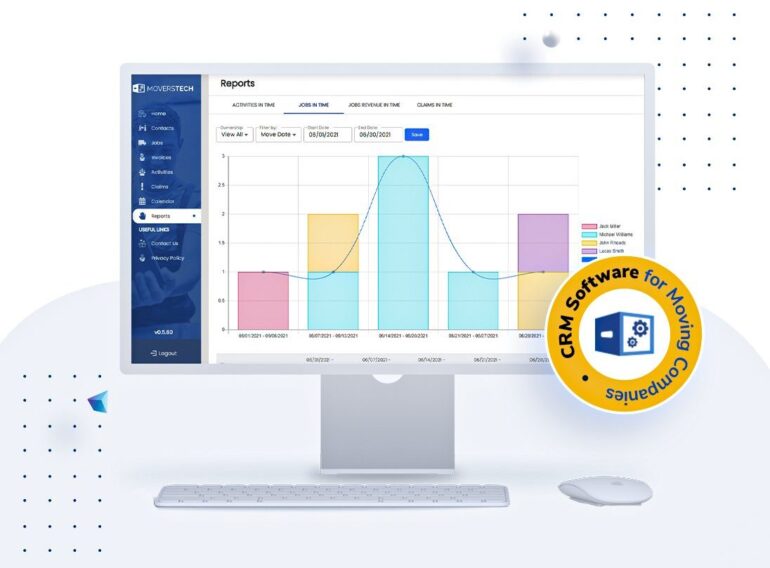Efficiency and customer satisfaction are key to standing out from the competition. Traditional methods like spreadsheets, while familiar, fall short in managing the complex demands of moving jobs and customer interactions. Recognizing this gap, many companies are turning to specialized solutions. Here are 10 compelling reasons to switch from spreadsheets to moving CRM, focusing on how a tailored tool like MoversTech CRM can significantly enhance operational efficiency and improve customer engagement for moving companies. This transition streamlines administrative tasks and opens up new avenues for business growth and service excellence.
When is it time to switch from spreadsheets to moving CRM?
There’s arguably no clear, definitive time or factor. You may start having difficulty keeping track of your daily schedule. You may notice a deterioration of internal collaboration, a decline in your sales funnel’s efficiency, or that you’re starting to lose data. Regardless, a general feeling of disorganization is a good first indicator.

Recognizing when spreadsheets fall short is key for moving companies. MoversTech CRM specifically caters to this industry’s unique needs, offering customizable features that streamline operations. Customizable lead capture forms ensure you gather essential client information right from the start. Advanced job scheduling capabilities allow for efficient resource allocation and adaptability to sudden changes, ensuring reliability and customer satisfaction. Personalized communication templates maintain your brand’s voice across all client interactions, enhancing the overall customer experience.
1. You’re starting to lose key customer data
Managing a few leads with spreadsheets and a handful of staff members is manageable when a business is small. But as the business grows and the volume of data increases, the limitations of spreadsheets become evident. The need to switch from spreadsheets to a CRM system becomes not just appealing but often necessary for continued growth.
Relying on spreadsheets for an expanding business can lead to errors, such as unreliable notes and missing vital customer information. These mistakes can negatively affect the sales process. Transitioning to a CRM helps avoid these issues, ensuring data is accurate and accessible, which is essential for scaling up operations effectively.
2. Manual spreadsheet entries are taking up too much time
The reliance on manual spreadsheet entries is not only time-consuming but also diverts your team from focusing on core sales activities. MoversTech CRM revolutionizes this process with its automation capabilities, notably automated lead capture that consolidates leads from multiple sources directly into your system, bypassing manual data entry. Your ability to capture leads with moving CRM grows exponentially, which is exactly what you want as a moving business owner.

Automatic dispatching efficiently allocates jobs, optimizing resource utilization, while financial processes, including invoicing and payment tracking, are streamlined for accuracy and efficiency. By adopting moving CRM, moving companies can significantly reduce administrative overhead, allowing the team to dedicate more time to customer engagement and strategic growth initiatives, thereby enhancing overall business productivity.
3. Team collaboration is lacking
The challenge of inadequate collaboration within your team can significantly impede performance, signaling the need for a shift from spreadsheets to a more collaborative platform like a CRM. Instances where your office team or moving crew require multiple communications for each issue or lead, coupled with the disorganization that leads to lost data and spreadsheets, highlight the inefficiency inherent in traditional methods.

MoversTech CRM facilitates enhanced internal collaboration through its integrated communication tools and task assignment functionalities. This specialized software enables seamless coordination among team members, ensuring everyone is aligned on tasks and responsibilities. The integrated messaging system within the CRM allows for real-time communication, ensuring that queries, updates, and vital information are shared promptly, reducing the need for repetitive conversations and meetings.
Moreover, the task assignment feature within MoversTech CRM ensures that each team member knows their responsibilities clearly, with tasks allocated based on expertise and availability. This clarity in roles and tasks eliminates confusion and overlaps in work, fostering a more organized and efficient workflow. This is just one of many ways how CRM can help your employees be more efficient.
4. Sharing spreadsheets manually is ineffective
The manual sharing of spreadsheets among team members can often lead to inefficiencies and errors, compromising data integrity and operational effectiveness. This method leaves too much room for error, with instances of the wrong spreadsheets being shared or not shared promptly. Such challenges can severely impede the workflow and collaboration within a moving company, leading to potential mishaps in customer management and service delivery. These scenarios make the switch from spreadsheets to moving CRM a necessity in order to stay competitive.
MoversTech CRM addresses these challenges head-on with its centralized database and real-time update features. By providing a single source of truth for all customer and operational data, MoversTech ensures that every team member has access to the same, most up-to-date information, reports and analytics at all times. This eliminates the confusion and errors that can arise from manually sharing and updating spreadsheets, thereby ensuring data integrity and reducing the likelihood of errors.
Moreover, the real-time update capability means that any changes made by one team member are immediately reflected across the system and accessible to everyone. This feature facilitates seamless collaboration and communication among team members, allowing for more efficient case management and operational execution. With MoversTech, moving companies can significantly enhance their internal processes, ensuring that teams work seamlessly together, leveraging accurate and timely information to deliver superior service to their clients.
5. Assigning tasks is too time-consuming
Similarly, you may start to find assigning tasks daunting or chaotic. Indeed, delegating tasks individually may take too much time, to the point where you needlessly lose time best spent elsewhere. A CRM could let you assign tasks to one centralized place, reducing the chance of losing a deal due to delays or mistakes.
6. You’re lacking insights on conversions and sales
Your team aside, you may lose track of what turns leads into customers. Spreadsheets can provide basic record keeping, but they don’t allow you to track and compare data points. Your sales reps can use all the insights they can get, and a CRM can do just that.
MoversTech CRM elevates your understanding of business operations, customer behavior, and performance metrics through its advanced reporting and analytics tools. These features offer comprehensive data points that inform your decisions and improve your business with software. These insights beyond basic records enable moving companies to track, compare, and analyze various data points effectively. With MoversTech, you gain access to comprehensive reports that shed light on conversion rates, sales trends, and customer engagement patterns. This wealth of information supports data-driven decision-making, allowing you to refine your strategies and operations based on solid evidence.
Moreover, the predictive analytics capability of MoversTech CRM empowers you to anticipate market trends and customer needs, providing a strategic advantage in planning and executing your sales and marketing initiatives.
7. You’re lacking insights on individual sales reps’ performance
Working with spreadsheets may not give you a clear view of individual sales reps outside of your team’s overall performance. Without such insights, you can’t hold underperforming reps accountable or coach your team effectively. If you need such insights, it may be time to migrate from spreadsheets to a CRM.
8. Reporting and forecasting are becoming tedious
As your business expands, you may find that spreadsheets don’t favor quick and efficient reporting and forecasting. A CRM could let you bypass the need for manual input and, at times, physical presence and hasten the process. What’s more, analytical CRM specializes in predictive models that can inform your forecasts.

9. Your spreadsheets’ security is lacking
The security of customer information is paramount, yet spreadsheets often fall short of providing adequate protection against unauthorized access and potential breaches. It is one of the most critical reasons to switch from spreadsheets to CRM. MoversTech CRM addresses these security concerns head-on with its superior security features to safeguard sensitive data.
Furthermore, MoversTech CRM implements robust access controls, allowing only authorized personnel to view or modify specific data sets, significantly reducing the risk of information leakage or unauthorized access. Transitioning to MoversTech CRM allows moving companies to protect their valuable customer data with state-of-the-art security measures, ensuring peace of mind and maintaining client trust.
10. Everything just feels disorganized
Lastly, even if you can’t pinpoint the exact issue yet, you may simply get a general feeling that you’re disorganized. It may be any number of factors, but they can all likely boil down to a simple truth; spreadsheets can’t keep up with your demands. A CRM can truly elevate your organization and collaboration to new heights and let you shake off the feeling.
It might be time to switch from spreadsheets to moving CRM
Choosing a CRM tailored to the unique demands of the moving industry is crucial for overcoming the limitations of traditional spreadsheets and driving your business forward. MoversTech CRM stands out as a specialized solution, meticulously designed to address moving companies’ specific challenges. With features like encrypted data security, automated operations, insightful analytics, and the option to text or email directly from CRM, MoversTech not only remedies the inefficiencies of manual processes but also enhances strategic decision-making and customer engagement. Embracing MoversTech CRM means investing in a platform that not only understands the intricacies of your industry but also empowers your business to achieve new heights of success.
Stay Informed
Subscribe for industry
news & updates
"*" indicates required fields
